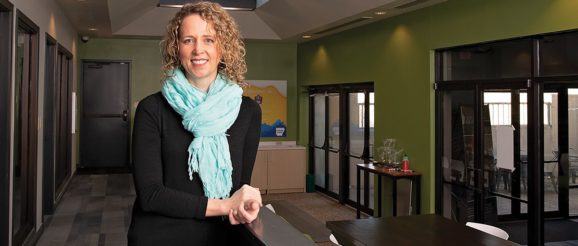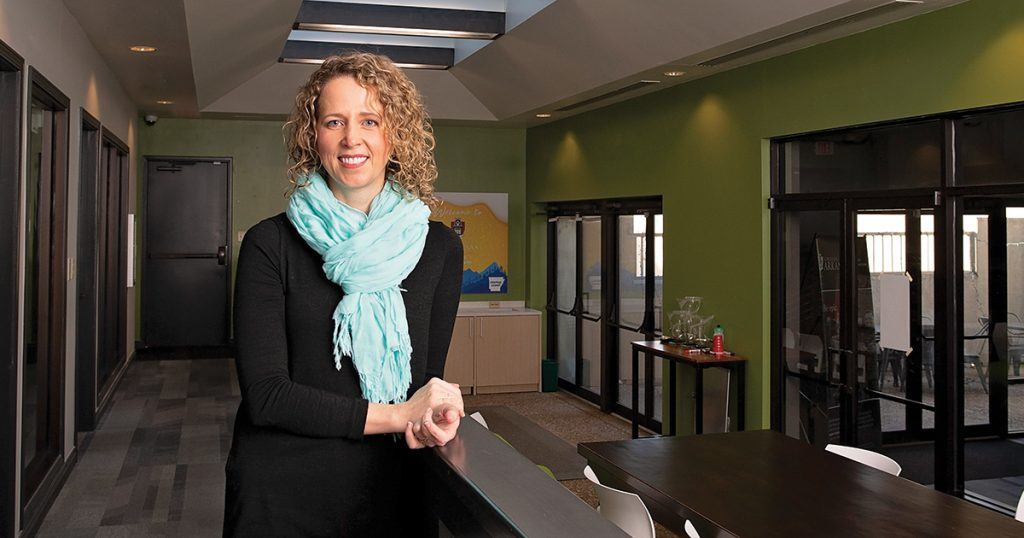Sarah Goforth guides University of Arkansas’ entrepreneurship, innovation office


Sarah Goforth has overseen the programs supporting entrepreneurship and innovation at the University of Arkansas since June 2019.
As executive director of the Office of Entrepreneurship and Innovation, Goforth’s role is a joint appointment with the Sam M. Walton College of Business and the Office of the Vice Chancellor for Economic Development. The Office of Entrepreneurship and Innovation was established in 2011. Carol Reeves comprised the office initially and was instrumental in its establishment. She transitioned this past summer from associate vice chancellor for the office to a faculty role.
In 2017, Reeves hired Goforth as director of outreach for the office after serving as the chief communications officer for the Smithsonian’s National Museum of Natural History on the National Mall in Washington, D.C.
A native of Strickler in Washington County, Goforth had looked to return to Arkansas to be closer to family after living on the East Coast for 20 years. Since she started at the UA, Goforth has co-taught the graduate-level New Venture Development course sequence with Reeves, who has been teaching it since 2002.
“I have been doing entrepreneurial things for a long time and had started doing more interdisciplinary work but really thought there needed to be a university-wide office to coordinate entrepreneurship and innovation efforts,” Reeves said.
She worked with the provost to establish the office that originally was a division of the vice provost’s office. Stacy Leeds, vice chancellor for economic development, oversees the Office of Entrepreneurship and Innovation as one of several divisions of the Office of Economic Development, which was created in February 2018.
“[The Office of Entrepreneurship and Innovation] fulfills, first and foremost, a service and support mission of bringing innovations to fruition — by providing training, tools, mentoring and support for the university community [students, faculty, staff, alumni],” Leeds said. “This work naturally has a spillover effect to the region’s entrepreneurial ecosystem and to the economic development of the state.”
OFFICE GOALS
Some of the office’s priorities include launching the annual international graduate student startup competition, the Heartland Challenge; scaling the programs to allow students from any discipline to access them at any stage of their academic life; making formal and extending the existing mentor program for entrepreneurs; developing industry partnerships to allow students to work on “meaningful problems;” and bridging social entrepreneurship with the UA’s existing strength in technology commercialization, Leeds said. “We are constantly assessing our impact to confirm that we are a key component to our state’s ability to sustain a thriving and self-renewing community of innovators and entrepreneurs.”
The interest of students and faculty in entrepreneurship has been a measure of success for the Office of Entrepreneurship and Innovation. The metrics related to the number of events and its attendees can determine the office’s success, Reeves said. But what the office has tried to do is change a mindset, she said, adding the office was strengthened as a result of a $23.7 million investment from the Walton Family Charitable Support Foundation in November 2018. The money was split between the Office of Research and Innovation and the Office of Economic Development as a catalyst for economic activity in the state through the development of research, innovation and commercialization of new technologies.
Student success is another measure of the strength of the office. Since 2002, student teams have won more than 90 business plans competitions and raised more than $3 million in prize money, according to a UA economic impact study. Those businesses have gone on to raise more than $60 million. Over the past five years, more than 142 businesses were formed with some UA affiliation as a result of its entrepreneurial efforts.
The office engages with 500 to 600 entrepreneurs, and between 75 and 100 have businesses, Goforth said. The majority are students, and about 20% are alumni. Goforth oversees five full-time staff along with an “army” of students, some of whom are employees, interns or volunteers, she said.
‘IRREPLACEABLE MENTORSHIP’
UA senior Matthew Sij, who’s studying computer science, was introduced to the Office of Entrepreneurship and Innovation in spring 2019 after joining a student startup as a founder. He explained the office and the Brewer Family Entrepreneurship Hub offered the business with resources, support and room to work “where everyone was passionate about entrepreneurship.”
The office also provided the startup with a “rough idea of where we should go and what we should do,” Sij said. “As our startup grew [and ultimately failed], the office continued to be a place where I could work, grow and learn. Sarah has become an irreplaceable mentor who is truly supportive of my dreams and ambitions, a sentiment I know she shares with all students. The connections I have made through the office have given me incredible jobs, irreplaceable mentorship and opened me up to a world of possibilities.”
Sij, who will graduate in May, said he plans to spend the next few years improving his software development skills before starting another venture, unless he’s presented with the right idea.
“Being able to think like an entrepreneur allows you to enter a workforce knowing that things are going to change and expecting that and being energized and excited by that, knowing that if you lose your job because a new technology comes along and the old business model is no longer working you can start something new,” Goforth said. “You can … see problems out there and instead of being scared of them or discouraged, you can be energized by them and you have tools that allow you to go tackle them, creating a business model to solve a problem. That’s what entrepreneurship is.
“What gets me out of bed is helping students at all stages of their careers — the ones that want to start companies and those who want to have a meaningful life — have a mindset that allows them to think in that way.”
NEW LEADERSHIP
While she’s new to leading the office, “Sarah’s footprint on the local ecosystem is deep and wide,” Leeds said. “Her insatiable drive to improve personally and professionally is infectious, and she naturally projects the aura of an innovator. She is incredibly deliberate and thoughtful about how she mentors others, and that intellectual power is complemented by the gift of truly connecting with students and key partners on a personal level.”
Goforth’s first opportunity to start a business was when she worked in Washington, D.C., as a freelance science writer in her early 20s and needed a business for a writing contract. She spent about six years working as a freelance science writer, and her work has been published in Smithsonian Magazine, Popular Science, The Journal of Neuroscience, Discovery.com and The Dallas Morning News.
The writing work led to a full-time job with the Discovery Channel in April 2006. She was interactive producer and senior editor and producer, overseeing science journalism platform Discovery News. She worked there until June 2009 when she joined the Howard Hughes Medical Institute. She was manager of print and electronic publications and senior manager of marketing and was part of a team that founded science documentary production startup Tangled Bank Studios. She led the audience and digital strategies for its first three films, including Emmy Award-winning PBS series “Your Inner Fish.”
In June 2015, she joined the National Museum of Natural History as chief communications officer. She served on the executive leadership team and oversaw the museum’s marketing, digital media and public relations teams. She also helped bring to life a film originally named “Lineage” that aired in June 2019 on the Smithsonian Channel and PBS as “When Whales Walked: Journeys in Deep Time.”
When Reeves hired Goforth three years ago, she thought she had recruited a communications specialist. Goforth has 21 years of experience in science communications and marketing.
“She is fabulous at that, but it became apparent very, very quickly that her skill set went far beyond that,” Reeves said. “She’s a great strategic thinker, she’s great at coming up with new programs and trying to get everybody to collaborate.”
Goforth started a monthly conference call to discuss upcoming events and projects with other entrepreneurial programs across the state, and with her science background, Goforth can help students and faculty to better communicate projects in the field to businesses, Reeves said.
Goforth’s office is at the Brewer Family Entrepreneurship Hub at 123 W. Mountain St. on the Fayetteville square. Other spaces within the Office of Entrepreneurship and Innovation include the Startup Village at 240 N. Block St. and McMillon Innovation Studio at 146 N. Harmon Ave. Her faculty role at the business college is within the new Strategy, Entrepreneurship and Venture Innovation department, and she’s helping to develop the undergraduate curriculum for it.
The post Sarah Goforth guides University of Arkansas’ entrepreneurship, innovation office appeared first on Talk Business & Politics.
